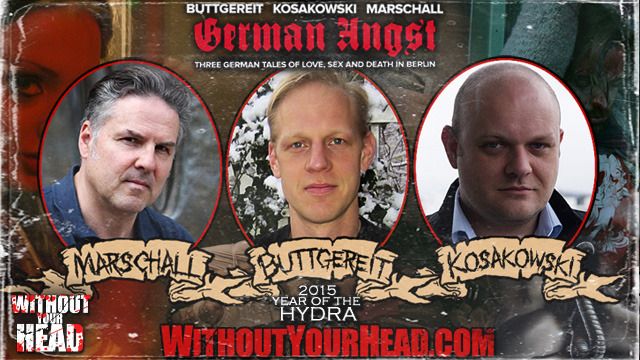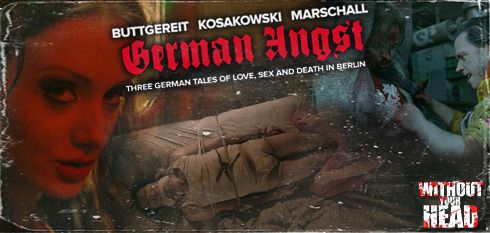 |
| Tune in to Without Your Head Horror Radio - Live Thursdays |
Recap of Jörg Buttgereit, Michal Kosakowski, and Andreas Marschall on
Without Your Head Horror Radio, 03/05/2015
by Vic Schiavone
Hosts Nasty Neal and Annabelle Lecter welcomed Jörg Buttgereit, Michal Kosakowski, and Andreas Marschall, the three directors of the German horror anthology film “German Angst”, to Without Your Head Horror Radio for an over-an-hour-long discussion going over all aspects of this amazing and controversial new film.
Highlights included the following:
WYH: How did the three of you get together to start the movie? When did the idea of “German Angst” come about?
AM: “It was my idea when I was touring with my last film “Masks”. I was asked what Jörg Buttgereit is doing, because there were a lot of these anthology movies, like “The Theater Bizarre”, around at this time and no German movies of this kind, and so people were asking. And I’ve known Jörg a very long time, since the 80’s, 1983, when I did the poster art work for “Nekromantik”…Then I asked him what about doing an episode of an anthology movie, and he agreed. I met Michal in a film festival in Transylvania, where he was with his film “Zero Killed”, and he joined the group and so we started working on this project.”
WYH: What does the name “German Angst” mean to each of you? Why the name “German Angst”?
AM: “It’s meant ironically. Normally German Angst means a political term which describes German anxiety for atomic energy and for war and stuff like this, but we took this term absolutely literally because angst means fear in German, and it’s our version of fear.”
JB: “The thing is that, actually, Germans are afraid of horror movies, so to use the term German Angst also tries to establish that there is such a thing as German horror cinema, which is something that we had in the 20’s but we don’t have that anymore. Doing horror movies is a very bad idea in Germany because you really can’t earn your money with it and to be honest we made this film with very little money, with private investors, with crowd funding, and the movie is finished but the people are not paid yet. So, to do a horror movie like this over here is something you really have to want to do. It’s totally different from the United States where you have a very established horror film culture.”
MK: “Regarding myself, I was born in Poland, and I’m Polish, and for me this was an exciting exercise to think from my Polish perspective, living in Berlin for many years, in Germany for many years, what German Angst means to me. So I came up with my story that you saw, the ‘Make a Wish’ episode, and I’m sure that many Germans will be offended.”
WYH: When you each picked your story for the movie, did you want them to have a connection with each other?
AM: “The connection is the city; it’s Berlin. Each story has a very distinctive way to tell you something about Berlin, but in a very different way. We wanted to do each story as different as possible and as unique as possible following the personal visions of the author, but we wanted the film to have a connection by the city, by the location. I think the interesting thing about the film is that even though the stories are very different you make a journey through the stories. From a very private atmosphere in Jörg’s episode, opening up to a more urban atmosphere in Michal’s episode, and then going into to the night; into a much “Labyrinthic” story in my episode. So you have three completely different things but you’ve got a great journey through different temperatures.”
WYH: Was there a specific reason why the stories are told in the order that they are told?
JB: “When I came up with my story for me, it was quite sure that this has to be the first story because it’s such a slow build-up…I wanted to do a very quiet movie and I didn’t know what these guys were up to so I asked to do the prologue, the prelude.”
MK: “Actually, my episode was supposed to be the last one, and Andreas Marschall’s ‘Alraune’ the second episode. After we finished the editing process, we had this idea of why not putting the ‘Alraune’ episode at the end because when my episode was the last one that was pretty hardcore to leave the audience with that kind of ending…We thought it’s nicer to put Andreas’ episode as the last one which gives you more space to breathe after my episode and at the same time the ‘Alraune’ episode is the longest one, and it was good to put it at the end because if you put the longest episode in the middle then the audience will unconsciously start asking themselves when is the next coming. Having the longest as the last one it was clear it’s the last one so everybody can relax somehow.”
WYH: How important is the cathartic experience that you receive from making a film such as this?
JB: “Since we made a movie that isn’t a product, I think we work more in terms of how artists work. I consider myself an artist, and while doing a film I explore the things that disturb me. And I don’t have the answers to all the questions that are raised in the film…The stuff that puzzles me turns up in the art works I do.”
AM: “For me the term of catharsis is also very important. Very often people ask me, “Why don’t you do normal films? Why do you do horror films?” For me it’s definitely not a commercial decision because commercially it’s sort of suicide in Germany to do a horror film because this genre is absolutely not accepted. For me, it’s a personal thing because the films that impress me the most were horror films because they have the possibility to tell truth in a metaphorical serial way and as a horror film maker you are not bonded to reality; you can show the reality of dreams and the reality of your soul…This is the point which for me makes horror films unique and universal worldwide in every culture.”
Other topics discussed included:
- What was it about Michal Kosakowski’s episode (‘Make a Wish’) that made it personal for him?
- How important was it to the cohesiveness of the film to have the same production team working on each segment?
- Who provided the music and score for “German Angst”?
- Why was it so important to Jörg Buttgereit to pick the particular age he did for the girl in his episode (‘Final Girl’)?
For further information about “German Angst”, go to http://www.german-angst.com/.


